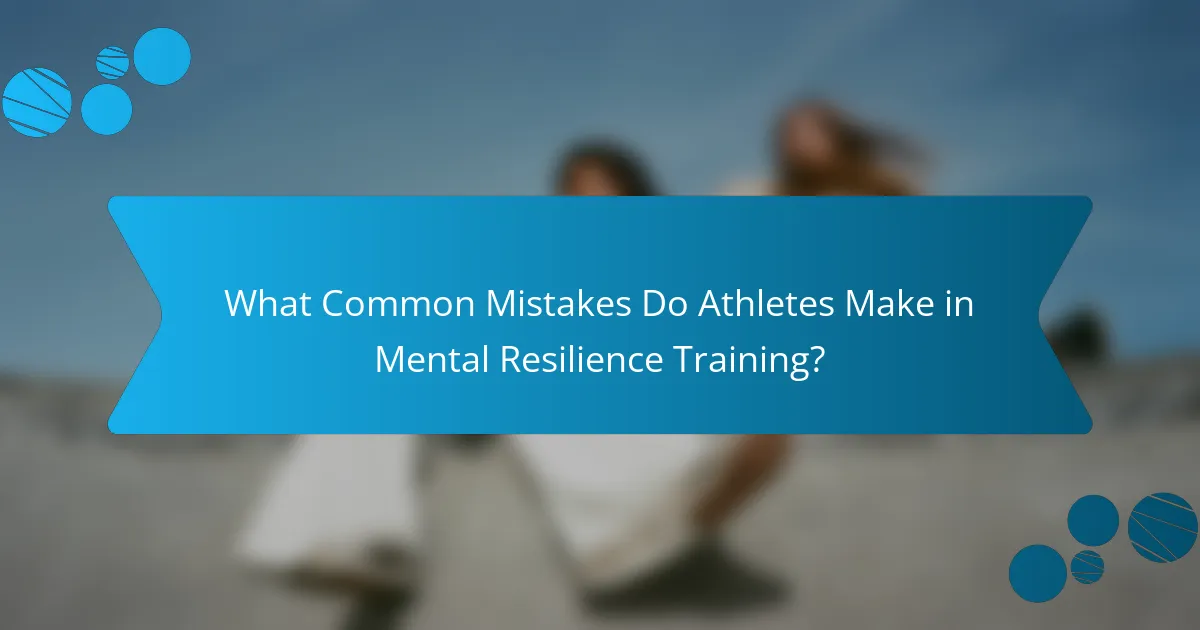Mental resilience is vital for athletes seeking to enhance their performance under pressure. This article explores techniques such as visualization, mindfulness, and goal setting to develop mental strength. It also highlights common mistakes athletes make in resilience training and offers strategies for coaches to support their athletes. Understanding and applying these techniques can lead to improved focus, adaptability, and overall performance in sports.

Why is Mental Resilience Crucial for Athletic Performance?
Mental resilience is crucial for athletic performance as it enhances focus, adaptability, and emotional control under pressure. Techniques such as visualization, positive self-talk, and mindfulness training help athletes develop this resilience. Research shows that mentally resilient athletes perform better in high-stress situations, leading to improved outcomes and consistency in their performance. Mental resilience not only boosts confidence but also fosters a growth mindset, enabling athletes to learn from setbacks and maintain motivation.
How does mental resilience impact an athlete’s performance under pressure?
Mental resilience significantly enhances an athlete’s performance under pressure by enabling better focus and emotional control. Techniques such as visualization, mindfulness, and positive self-talk can improve mental resilience. For instance, visualization helps athletes imagine success, reducing anxiety. Mindfulness practices promote present-moment awareness, preventing distractions during competition. Positive self-talk counters negative thoughts, boosting confidence. Research shows that mentally resilient athletes often outperform peers in high-stakes situations, demonstrating the value of these techniques.
What are the psychological benefits of developing mental resilience?
Developing mental resilience offers significant psychological benefits for athletes. Enhanced focus, improved stress management, and increased confidence are key advantages.
Resilient athletes can maintain concentration even under pressure, which boosts performance. They handle setbacks more effectively, viewing challenges as opportunities for growth. This mindset fosters a positive self-image, enhancing overall confidence.
Moreover, mental resilience contributes to better emotional regulation. Athletes learn to manage anxiety and frustration, leading to a more stable mental state during competitions. This stability allows for optimal performance and sustained motivation.
Finally, resilience builds a strong sense of community and support among athletes. Sharing experiences and strategies fosters collaboration, creating a network that enhances collective performance.

Which Techniques Enhance Mental Resilience for Athletes?
Mental resilience techniques for athletes include visualization, mindfulness, and goal setting. These methods enhance focus and reduce anxiety, leading to improved performance.
Visualization involves mentally rehearsing successful outcomes, which can boost confidence. Mindfulness practices help athletes stay present, reducing stress and improving concentration. Goal setting provides clear targets, motivating athletes to push through challenges.
Incorporating these techniques can significantly impact an athlete’s mental strength, fostering a positive mindset essential for peak performance.
How can visualization techniques improve mental toughness?
Visualization techniques significantly enhance mental toughness by improving focus and resilience. These techniques allow athletes to mentally rehearse scenarios, boosting confidence and reducing anxiety. Research indicates that visualization can activate similar brain regions as actual performance, enhancing skills and preparedness. Regular practice fosters a strong mental framework, helping athletes to overcome challenges and maintain composure under pressure.
What role does mindfulness play in building resilience?
Mindfulness significantly enhances resilience in athletes by improving focus and emotional regulation. Practicing mindfulness helps athletes manage stress, recover from setbacks, and maintain a positive mindset during challenges. Research indicates that mindfulness practices can lead to better performance outcomes and increased mental toughness. Regular mindfulness training fosters a deeper connection to the present moment, allowing athletes to respond effectively to high-pressure situations.
How does goal setting contribute to mental strength?
Goal setting significantly enhances mental strength by providing direction, focus, and motivation. It encourages athletes to set specific, measurable, achievable, relevant, and time-bound (SMART) objectives, fostering resilience. This structured approach helps athletes navigate challenges and setbacks effectively. As a result, they develop a stronger mindset, enabling them to perform optimally under pressure.

What Unique Resilience Strategies Do Elite Athletes Use?
Elite athletes utilize unique resilience strategies such as visualization, mindfulness, and goal-setting to enhance performance. Visualization involves mentally rehearsing successful outcomes, which boosts confidence. Mindfulness practices help athletes maintain focus and reduce anxiety during competitions. Goal-setting provides a clear roadmap, fostering motivation and perseverance. These techniques are essential for overcoming challenges and achieving peak performance.
How do Olympic athletes incorporate mental training into their routines?
Olympic athletes incorporate mental training through techniques like visualization, mindfulness, and goal-setting. These methods enhance focus and resilience, crucial for high-stakes competition. Visualization allows athletes to mentally rehearse performance, improving confidence. Mindfulness practices reduce anxiety, fostering a calm mindset. Goal-setting provides clear targets, driving motivation and progress. Together, these techniques create a comprehensive mental training regimen that supports peak performance.
What specific practices do professional teams employ for mental resilience?
Professional teams employ mental resilience practices such as visualization, mindfulness training, and cognitive-behavioral techniques. These methods enhance focus, reduce anxiety, and improve performance under pressure.
Visualization helps athletes mentally rehearse their performance, increasing confidence. Mindfulness training promotes present-moment awareness, aiding emotional regulation. Cognitive-behavioral techniques address negative thoughts, fostering a positive mindset.
Additionally, teams often incorporate regular mental health check-ins and workshops to reinforce these skills, ensuring athletes develop a robust mental framework.

Which Rare Attributes of Mental Resilience Techniques Are Effective?
Certain rare attributes of mental resilience techniques can significantly enhance athletic performance. Techniques that incorporate visualization, mindfulness, and adaptive thinking are particularly effective.
Visualization allows athletes to mentally rehearse their performance, fostering confidence and focus. Mindfulness practices help in managing stress and maintaining concentration during competitions. Adaptive thinking encourages flexibility in strategy, enabling athletes to adjust to changing situations effectively.
These attributes are less commonly emphasized but can provide a unique edge in high-pressure environments. Integrating these techniques can lead to improved outcomes in both training and competition.
How do cultural differences influence resilience techniques among athletes?
Cultural differences significantly influence resilience techniques among athletes by shaping their mental frameworks. For example, collectivist cultures may emphasize team cohesion and support, while individualistic cultures often focus on personal achievement and self-reliance. These varying perspectives can dictate how athletes cope with stress and adversity.
Athletes from collectivist backgrounds might employ communal rituals or group affirmations, enhancing their emotional support network. Conversely, those from individualistic cultures may adopt self-reflective practices or visualization techniques to foster mental strength.
Furthermore, cultural values can affect the perception of failure and success. In some cultures, failure is viewed as a learning opportunity, promoting a growth mindset, while in others, it may lead to shame and reduced resilience.
Understanding these cultural influences can help coaches tailor resilience training to meet the specific needs of diverse athletes, ultimately enhancing their performance.
What uncommon methods have been successful for athletes facing burnout?
Uncommon methods that have successfully helped athletes facing burnout include mindfulness practices, creative visualization, and nature immersion. Mindfulness techniques reduce stress and enhance focus, allowing athletes to reconnect with their motivations. Creative visualization fosters mental resilience by enabling athletes to envision successful performances, boosting confidence and reducing anxiety. Nature immersion promotes mental clarity and rejuvenation, as exposure to natural environments has been linked to improved mood and cognitive function.

How Can Coaches Support Athletes in Developing Mental Resilience?
Coaches can support athletes in developing mental resilience by implementing targeted techniques. These include fostering a growth mindset, promoting positive self-talk, and encouraging visualization practices.
1. Foster a growth mindset: Coaches should emphasize that challenges are opportunities for growth, helping athletes view setbacks as part of the learning process.
2. Promote positive self-talk: Encouraging athletes to replace negative thoughts with constructive affirmations enhances their confidence and focus.
3. Encourage visualization practices: Coaches can guide athletes in visualizing successful performances, which can improve mental preparedness and reduce anxiety.
These techniques build mental resilience, enabling athletes to perform better under pressure.
What training programs are most effective for enhancing athletes’ mental toughness?
Effective training programs for enhancing athletes’ mental toughness include cognitive behavioral techniques, mindfulness training, and visualization exercises. These approaches help athletes manage stress, improve focus, and increase resilience.
Cognitive behavioral techniques focus on changing negative thought patterns, promoting a positive mindset. Mindfulness training enhances present-moment awareness, reducing anxiety during competition. Visualization exercises allow athletes to mentally rehearse their performance, boosting confidence and preparedness.
Research shows that athletes who engage in these mental resilience techniques report improved performance and greater emotional stability during high-pressure situations. Incorporating these strategies into regular training can significantly enhance overall athletic performance.
How can coaches identify and address mental resilience gaps in their athletes?
Coaches can identify mental resilience gaps by assessing athletes’ responses to stress and adversity. They should implement targeted techniques to strengthen these areas.
Observation of performance under pressure reveals resilience levels. Coaches can use mental skills assessments, such as self-report questionnaires, to quantify resilience. Regular feedback sessions encourage athletes to express their mental challenges.
Training sessions should incorporate stress simulation to observe coping mechanisms. For example, introducing competitive scenarios can highlight weaknesses in mental toughness.
Addressing these gaps involves personalized mental resilience training. Techniques like visualization, mindfulness, and goal-setting can enhance an athlete’s ability to manage stress effectively. Engaging athletes in discussions about their mental strategies fosters a supportive environment for improvement.

What Common Mistakes Do Athletes Make in Mental Resilience Training?
Athletes often make several common mistakes in mental resilience training that hinder their performance. One major error is neglecting the importance of consistency; sporadic practice leads to weak mental fortitude. Another mistake is focusing solely on physical skills while ignoring mental strategies, which are crucial for overcoming challenges. Additionally, athletes may set unrealistic expectations, resulting in frustration and decreased motivation. Lastly, failing to seek feedback or support from coaches and peers can limit growth in mental resilience.
How can over-reliance on physical training hinder mental resilience development?
Over-reliance on physical training can impede mental resilience development by neglecting psychological strategies. Athletes may become physically strong but lack coping mechanisms for stress, leading to burnout. Balancing physical training with mental techniques, such as visualization and mindfulness, enhances overall performance. Studies show that athletes incorporating mental training report improved focus and emotional control, crucial for peak performance.
What misconceptions about mental toughness should athletes avoid?
Athletes should avoid misconceptions that mental toughness means never showing vulnerability. Mental resilience involves acknowledging emotions and seeking support. Another misconception is that mental toughness is innate; it can be developed through practice and techniques. Additionally, some believe mental toughness is solely about grit; it also includes adaptability and strategic thinking. Lastly, the idea that mental toughness guarantees success is misleading; it enhances performance but does not eliminate challenges.

What Best Practices Should Athletes Follow to Boost Mental Resilience?
Athletes can boost mental resilience by practicing mindfulness, setting clear goals, and maintaining a positive mindset. These techniques enhance focus and reduce anxiety during competition.
Mindfulness training helps athletes stay present and manage stress. Research shows that regular mindfulness practice can improve performance under pressure. Setting specific, measurable goals provides direction and motivation, fostering a sense of achievement. A positive mindset encourages resilience, enabling athletes to overcome setbacks and challenges effectively.
Incorporating these practices into daily routines can lead to improved mental strength and overall performance in sports.
Which daily habits can athletes adopt to strengthen their mental resilience?
Athletes can strengthen their mental resilience by adopting daily habits such as mindfulness, goal-setting, and positive self-talk. These techniques enhance focus and emotional regulation, leading to improved performance.
Mindfulness practices, like meditation and breathing exercises, help athletes manage stress and maintain concentration. Setting specific, achievable goals fosters motivation and a sense of purpose. Positive self-talk reinforces confidence and combats negative thoughts, crucial for overcoming challenges.
Incorporating these habits into daily routines can significantly impact an athlete’s mental toughness, ultimately enhancing their overall performance.
How can athletes effectively track their mental resilience progress?
Athletes can effectively track their mental resilience progress by using self-assessment tools, journaling, and setting measurable goals. Regularly evaluating stress responses and coping strategies enhances awareness. Utilizing mental resilience training programs provides structured feedback. Engaging with sports psychologists offers professional insights.